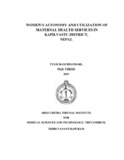Please use this identifier to cite or link to this item:
http://archive.nnl.gov.np:8080/handle/123456789/170| Title: | WOMEN’S AUTONOMY AND UTILIZATION OF MATERNAL HEALTH SERVICES IN KAPILVASTU DISTRICT, NEPAL A THESIS PRESENTED BY TULSI RAM BHANDARI TO |
| Authors: | BHANDARI, TULSI RAM |
| Keywords: | Women’s autonomy |
| Issue Date: | 24-Mar-2019 |
| Abstract: | Despite various efforts maternal mortality is still high in most low resource countries of Sub-Saharan Africa and South East Asia. Nepal has made remarkable progress in maternal mortality reduction. However, most indicators of Millennium Development Goal Five i.e. completion of four antenatal care visits, skilled care at birth, institutional deliveries and postnatal care visits have not attained set targets. The high utilization of maternal health care services makes it possible to reduce maternal and neonatal morbidity and mortality. Demographic factors, socio-economic characteristics of women, geographical location, availability and accessibility of health care services, needs of health care are some factors which determine the utilization of maternal health care services. Women’s autonomy is one of the determinants of maternal health care services utilization in developing countries. Most studies have focused on assessing the association with the demographic and socioeconomic factors and the utilization of maternal health care services rather than exploring the role of women’s autonomy as a mediating factor in the utilization of maternal health care services. There are a few studies which looked at women’s autonomy and its influence on the utilization of maternal health care in Nepal; however, most women’s autonomy measurement tools included very limited components of women’s autonomy. Only in a few cases their psychometric characteristics were assessed. |
| URI: | http://103.69.125.248:8080/xmlui/handle/123456789/170 |
| Appears in Collections: | 300 Social sciences |
Files in This Item:
| File | Description | Size | Format | |
|---|---|---|---|---|
| 02 Ph D Thesis_Tulsi Ram Bhandari.pdf | 2.18 MB | Adobe PDF |  View/Open |
Items in DSpace are protected by copyright, with all rights reserved, unless otherwise indicated.